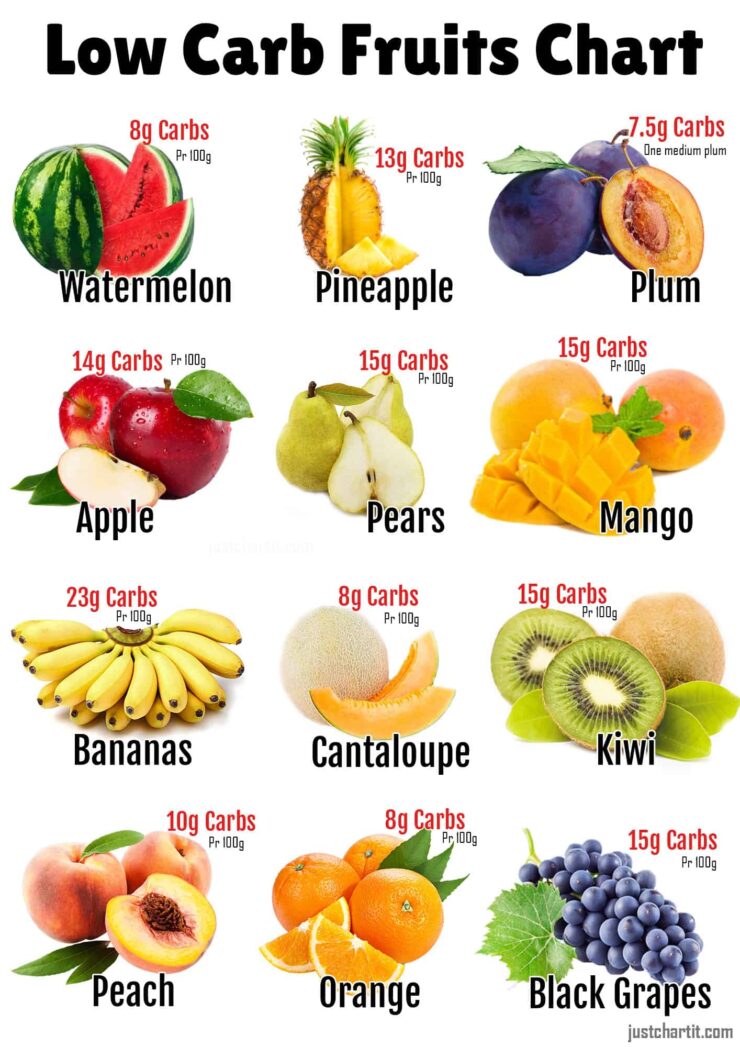It might be challenging for some to obtain enough fruit and low-carb vegetables each day, but as we all agree that it is vital, we have to consume them.
Fruit includes natural sugars that increase your carbohydrates each day. It also includes essential nutrients for your body. That’s why fruits are among the best low-carb foods you can consume.
Check out our compilation of the finest low-carbohydrates to be included in your healthy low-carb diet program.

Carbs in Watermelon
Summertime fruit, watermelon, is the least carb load and packs just 7,55 g per 100 g of fruit. There is little fiber, therefore most of it is absorbed through carbohydrates.
Watermelon also contains a high concentration of vitamin A and is high in water to supply you with fewer calories.
Watermelon is one of the most important fruits if you are trying to decrease carbohydrates and improve hydration.
Carbs in Pineapple
There are 13 grams of carbohydrates in a half cup of pineapple or 100 g. This tropical fruit is one of the greatest methods to obtain manganese, which impacts your neurological system, hormones, glucose levels, and your body’s absorption of calcium.
Pineapple is also an enzymatic mixture that digests protein, a natural source of bromelain.
Carbs in Plum
Plums are low in the carb count range, which is nutritious in addition to salads, yogurt, and juices. Little yet powerful, one medium plum offers just 7.5 g of carbohydrates but 100 mg of potassium to maintain hypertension and attacks.
Carbs in Apple
In several plans, apples are a delicious, easy option of fruits. Through herbal compounds known as flavonoids, Apples can do much for you.
Also have pectin, a fiber that helps to manage symptoms and reduce the consequences of reflux of acids. Diarrhea and constipation can also be helped by apple fiber.
Carbs in Pear
Pears are delicious and come under our low-carb fruit chart which has long been appreciated. Pears are high in folate, Vit C, copper, and potassium in particular.
They are also excellent natural antioxidant polyphenols. Calories, water, and fiber-packed pears are low. That composition makes it an ideal, fiber- and water-friendly meal.
Make Sure to Consume Peel Since It Contains Many of The Nutrients of This Fruit.
Carbs in Mango
Mangoes are delicious and joyful, sure to delight your palate buds. The majority of mango carbs are derived from the presence of sugar.
There is 22 g of sugar for one cup of sliced mango. A few of the carbohydrates in mangoes originate from their fiber content, in addition to sugar.
Eight to 14 percent of your everyday necessities come from a bowl of sweet mango. The fiber in mango delays the digestion in meals, so that sugar may be released and control appetite.
Read also: Sugar in Fruits Chart
Carbs in Banana
Bananas consist mostly of carbohydrates. Bananas that are unripe can include substantial amounts of stubborn starch that work like fiber, help your intestines and promote blood sugar control.
Bananas include many good levels of essential nutrients. Potassium, B6, and C vitamins are included. Because of their rich potassium and antioxidants, bananas might be helpful for cardiac health. Moreover, their strong pectins and starch might support the health of the gut.
Carbs in Cantaloupe
You would only consume around 8 grams of carbohydrates for every 100 grams of cantaloupe you take. Cholesterol-free, low in sodium, moderate vitamins and minerals, and an excellent source of folic are also found in cantaloupe.
Throw it into a smoothie snack mixer with yogurt and make it a part of your low-carb diet.
Carbs in Kiwi
It is undoubtedly one of several sweet and sour fruits, so you may presume that the low-carb diet is already off, however when you adopt this method you can also consume kiwi!
An antioxidant in kiwi may enhance the immune system, which can help reduce the risk of viral infections, as per previous research. Kiwis are big, fresh, or even mixed into a homemade Popsicle or smoothie.
Carbs in Peach
One of the numerous advantages of low-carbon fruits is that you can eat more. The peaches each have 100 grams. 5 grams of fiber and 10 net grams of carbs are wonderfully low, all of which you would not anticipate so delicious and nutritious.
One medium-sized fish provides 50 calories, 1 gram of protein, no fats, and 15% of essential vitamin C per day.
Carbs in Orange
Another option for a low-carbon diet is oranges. Oranges are indeed a potassium source that helps reduce high blood pressure.
In reality, previous studies have shown that boosting the consumption of added oranges may have the same beneficial effect as taking potassium supplements on blood pressure.
Carbs in Black Grapes
Black grapes contain only 15g of grams per 100g and are super easy to add to your low-carb diet as they are one bite.
Black grapes are being fully examined for their health. They include compounds that can enhance hair and healthy skin and protect your cells from cancer.
